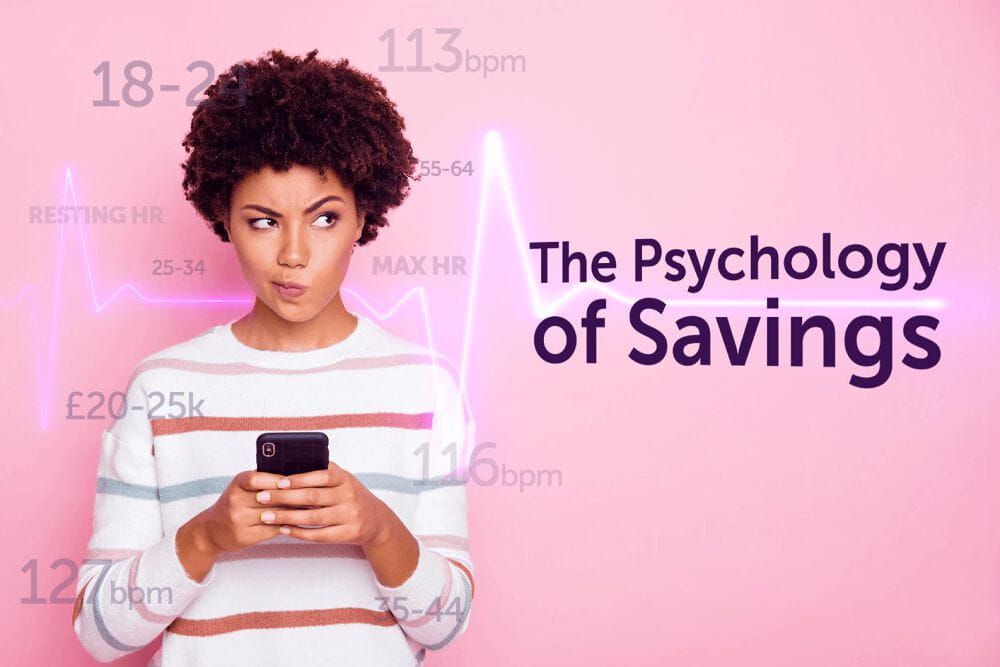The Psychology of Savings
Savings

If the pandemic has taught us one financial lesson, it’s the importance of being prepared for ‘unprecedented times’ and the need to be in control of our money.
Research from the Bank of England reveals that households saved more than £30bn over the first 3 months of lockdown*, as Brits had no choice but to batten down the hatches, stay home, and stop spending on non-essentials, as restaurants, pubs and many shops closed.
But how can we stay in control of our finances and keep saving as we return to some form of a ‘new normal’?
We’ve studied all aspects of the psychology of saving (and spending!), combining a survey, a scientific experiment and insight from an esteemed psychologist to answer some of the key questions around the mental impact of saving money and the effect this can have on our happiness.
Can money buy happiness?
We conducted an experiment looking into the heart rates of 15 participants, and their happiness levels, when spending £100 on non-essential items from online stores they love, to find out if the act of shopping really could make them happier.
Our data revealed that participants’ self-reported happiness levels did increase when shopping, however their heart rates had a much smaller percentage increase, showing that people think shopping makes them happier, but the impact is largely psychological.
Our survey backed this finding up, with 56% admitting to having used shopping as a mechanism to cheer themselves up or reward themselves.
Although shopping may seem like a fast-track way to boosting happiness, Associate Professor of Quantitative Social Psychology at Durham University, Mario Weick, warns that this effect only has a short-term impact.
“People are reasonably good at predicting how something makes them feel but poor at predicting how long those feelings will last. This durability bias can entice us to spend money because we are likely to overestimate how long a novel purchase can make us happy.”
How can we make sure we’re spending money for the right reasons?
Over half of us (52%) admit to feeling guilty after spending money on ourselves, with our experiment also revealing that happiness levels began to drop again an hour after shopping.
Mario comments: “Spending money is more likely to promote happiness when the purchase is intrinsically rewarding (e.g. life experiences, personal development, nurturing meaningful relationships), rather than driven by superficial motives such as trying to impress others.”
Our experiment also found that the participants’ peak heart rates when shopping were similar to their heart rate when going for a brisk walk. If you are craving that ‘shopping high’, ask yourself if you are spending purely to find instant happiness, or if this purchase will provide you with longer term fulfilment.
Try stepping away from the situation and doing something else to boost endorphins, such as exercising. If you still want the item an hour later, you are less likely to feel post-spending guilt as you aren’t acting on impulse.
How can we avoid shopping temptation?
In the modern world of online shopping and constant advertising, it can be easy to get swept away by the amount of flash sales and discount codes, with our survey revealing that almost half of us plan to take advantage of this year’s Black Friday sales.
But how can you avoid being sucked in? Mario says: “The purchasing experience is designed to give us a quick kick, with products to match that often emphasise fleeting pleasures. To resist those temptations, it can help to reflect on what makes us truly happy in the long run.
“One way to alleviate the pressure is to reduce one’s exposure and avoid the situation. It can actually end up being liberating and empowering to resist the pressure to make purchases.”
Can spenders become savers?
Our research revealed that 46% of Brits consider themselves as ‘savers’, compared to 26% who identify as ‘spenders’. However, there is still hope for even the most avid ‘spenders’, as experts say changing our spending habits is absolutely doable.
Mario comments: “The benefits of saving money materialise over time, so focusing on a future goal can make it easier to save money, whereas focusing on the here and now may encourage spending. The key to encouraging saving is to make it easy, sociable and fun.”
Try thinking of a habit you would like to change, such as buying a weekly takeaway. Instead of buying the takeaway, transfer that money into a savings account each week, with a clear goal of what you will spend that budget on at the end of the year.
How can we take control of our finances?
Although our experiment found that shopping did make participants feel happier, 75% of Brits say that saving £1000 would make them happier than spending £1000, suggesting that being in control of our spending and saving is the true key to long term financial happiness.
Mario says: “The evidence suggests that neither extreme spending nor extreme frugality are pathways to happiness. Uncontrolled spending can cause guilt and debt.
“On the other hand, being overly frugal can be burdensome and can cause excessive worries about spending money.
“A healthy balance between restraint and allowing oneself some pleasure and spontaneity is probably an optimal strategy to boost happiness. Saving some income, while giving oneself a spending allowance really does appear to be the golden formula.”
To make taking those first steps to becoming a ‘saver’ easier, Instant Saver accounts are a great option. Opening a savings account that allows you to add in any amount of money, however big or small, and knowing you can take that money back at any point if you need it, can make the process a lot less daunting.
Find out more about how to take the first steps to becoming a saver by opening an Instant Savers here.
References
* https://www.bankofengland.co.uk/statistics/money-and-credit/2020/may-2020#summary
Methodologies
Survey
The research was conducted by Censuswide on behalf of Atom Bank, with 2,007 participants from a nationally representative sample of UK adults aged 16+ across the UK between 09.10.2020 - 12.10.2020.
Experiment
All data based on the following: A 15 participant experiment of 8 men and 7 women between the ages of 18-63 conducted independently on behalf of Atom Bank. Each participant was given a £100 voucher for a favourite online store of their choice and equipped with a heart rate monitor. Participants resting heart rates were taken just before the shopping experiment, during the 1 hour online shopping period and during a 5 minute brisk walk for comparison purposes. Participants also self-reported their happiness levels before, during the experiment (at the point of checkout), and 1 hour post-experiment to compare these psychological metrics to the heart rate data. Participants were also asked to identify themselves as a ‘spender’ and ‘saver’ with data gathered according to these two groups.
